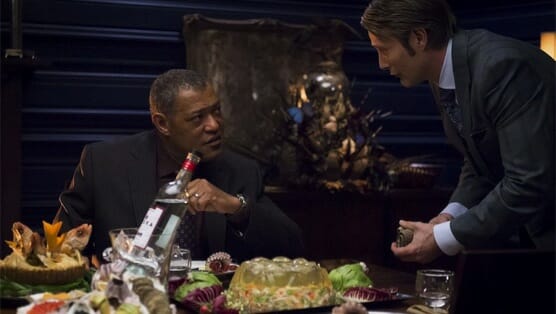Hannibal: “Tome-Wan”
(Episode 2.12)

While its more deliberate pace might not jive with all audiences, one of the great advantages of Hannibal’s slow-burn approach is how it allows the characters’ various plans and internal developments to play out in a more organic, dramatically satisfying fashion. For the past half-dozen episodes, we’ve witnessed Will working through the machinations of what appears to be his master plan to capture Hannibal. I say “appears to be” because one of the show’s unique—if frustrating—tendencies is to withhold significant elements of its plot from us. On one hand, the show’s penchant for depicting nightmarish dream imagery acts as the ultimate reflection of subjective storytelling; on the other, the characters often keep their cards close to the table, thus eschewing explanation for plot points that most shows would go out of their way to make clear. It’s the kind of show where we are made to wonder, for multiple episodes, whether our main character is actually becoming a killer or if it’s merely part of his elaborate revenge ploy.
“What Hannibal does is not coercion, it is persuasion,” says the titular character’s former therapist Dr. Bedelia Du Maurier (Gillian Anderson) at one point. Indeed, unlike most other narratives on TV, Hannibalgrants us the chance to see things like the antagonist’s psychological manipulations playing out over time. Certainly by the end, “Tome-Wan” goes a long way to demonstrate the true power of Hannibal’s persuasive personality.
As the episode opens, Will lays out his current plan to an increasingly impatient Jack Crawford. After turning Mason Verger against Hannibal in the previous episode, his hope is that the murderous psychiatrist will attempt to kill Mason, thus allowing Will to catch him in the act. The two also get some inside information in the form of Dr. Du Maurier, making her dramatic return after running away earlier in the season. Discussing Hannibal’s methods, Du Maurier emphasizes that his downfall will come about due to his flights of “whimsy.” In other words, in being so self-congratulatory, Hannibal leaves himself vulnerable to mistakes.
As Will expected, Mason eventually sends his cronies to abduct the good doctor. After preparing Hannibal to be dropped into his cage of hungry pigs, the psychotic magnate hands a knife to Will and allows him to draw first blood. Rather than cutting Hannibal’s throat, Will slashes him free instead. One of Mason’s thugs promptly whacks Will over the head and we are robbed of the knowledge of how this situation played out. Upon regaining consciousness, however Will quickly deduces that Hannibal again won the battle.
Elsewhere, he see a restrained Mason being pumped full of psychedelic drugs by Hannibal. As Mason begins cackling like a hyena, Hannibal begins manipulating his drug-addled mind, ultimately convincing him to start cutting himself.
-

-

-

-

-

-

-

-

-

-

-

-

-

-

-

-

-

-

-

-

-

-

-

-

-

-

-

-

-

-

-

-

-

-

-

-

-

-

-

-








































